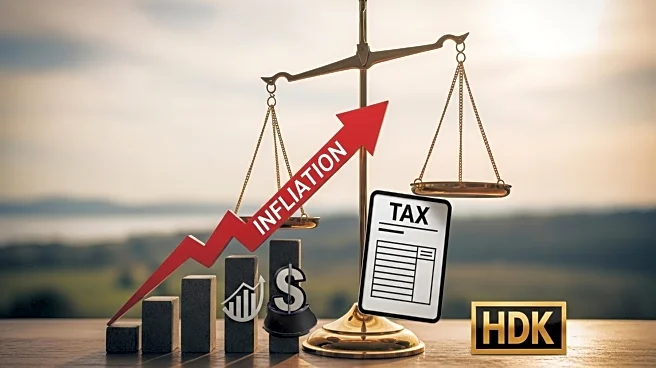What is the story about?
What's Happening?
The Internal Revenue Service (IRS) has announced adjustments to the federal income tax brackets and standard deductions for the year 2026. This annual adjustment is aimed at accounting for inflation, which can affect the purchasing power of taxpayers. The changes are expected to provide some relief to Americans when they file their taxes next year. The IRS's decision to modify these financial parameters is part of its routine process to ensure that tax burdens reflect current economic conditions. This adjustment is particularly significant as inflation has been a major concern for the U.S. economy, impacting various sectors and consumer prices.
Why It's Important?
The adjustment of tax brackets and standard deductions is crucial as it directly influences the amount of tax that individuals and families will owe. By accounting for inflation, the IRS helps prevent 'bracket creep,' where taxpayers are pushed into higher tax brackets due to inflation rather than an actual increase in real income. This can result in higher taxes without an increase in purchasing power. The changes can potentially ease the financial strain on taxpayers, especially those in lower and middle-income brackets, by reducing their taxable income and thus their tax liability. This move is also indicative of the government's response to ongoing economic challenges, including inflation, which has been affecting consumer spending and savings.
What's Next?
Taxpayers will need to familiarize themselves with the new tax brackets and standard deductions as they prepare for the upcoming tax season. Financial advisors and tax professionals are likely to update their strategies to align with these changes, ensuring that clients can maximize their tax benefits. Additionally, the IRS will continue to monitor economic indicators to determine if further adjustments are necessary in the future. Stakeholders such as policymakers and economists will be observing the impact of these changes on consumer behavior and the broader economy, potentially influencing future fiscal policies.
Beyond the Headlines
The adjustment of tax brackets and deductions also highlights the broader issue of inflation and its pervasive impact on the economy. As inflation affects various aspects of daily life, including wages, prices, and savings, the government's response through tax policy is a critical component of economic management. This development may also spark discussions on the effectiveness of current inflation measures and the need for comprehensive strategies to address economic stability.

















